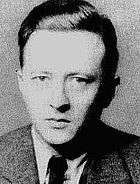Jerzy Jan Lerski

Jerzy Jan Lerski (nom de guerre: Jur; also known as George Jan Lerski; was a Polish lawyer, soldier, historian, political scientist and politician. After World War II he emigrated to the United States, where he became a full professor at the University of San Francisco.
Life
Born on January 20, 1917 in Lwów, Poland (now Lviv, Ukraine), Lerski studied law at Lwów University. In interwar Poland he joined the Stronnictwo Demokratyczne (Polish Democratic Party); he became known for his strong opposition to anti-semitic events.
Jerzy Lerski first saw action in World War II during the 1939 Polish September Campaign he fought at the battle of Brześć Litewski (holding the officer rank of Ensign or podchorąży). Taken prisoner by the Soviet Army during the Soviet invasion, he managed to escape from a train transport. He joined the anti-Soviet resistance but, with the NKVD (the Soviet Secret Police) actively looking for him, he escaped into Hungary to France, joining the Polish Armed Forces in the West. After the fall of France on June 25, 1940, Lerski went to Great Britain. In 1941 after taking the commando course he became a "cichociemny"(a member of a secret unit of the Polish Army in exile). Having been parachuted to occupied Poland in February 1943 he served as one of the couriers for the Polish Government in Exile - individuals who risked their life moving between the Polish exiled government in London, England and the Polish Secret State in occupied Poland. After collecting information from the Secret State he returned to London.
In November 1944 he was named secretary of the third Prime Minister of Poland in Exile, Tomasz Arciszewski (1877–1955). At a meeting between Arciszewski and the Prime Minister of the United Kingdom Winston Churchill, Lerski gave a detailed report on the plight of the Jews in Poland. On May 8, 1945, World War II ended in Europe. Lerski decided to remain in London instead of returning to Soviet-dominated communist Poland. He was active in the Polski Ruch Wolnościowy Niepodległość i Demokracja political movement. He resigned as Arciszewski's secretary in July 1947.
On the eve of the Cold War, Lerski moved from the United Kingdom to the United States. He obtained his Ph.D. in history from Georgetown University, 1953, and taught at several universities in US before joining the faculty at the University of San Francisco in 1966 where he became a professor and historian of the East Central Europe. His courses at USF were on Modern European History. Politically a conservative Republican, he feared the armed power of the Soviet Union against the unprepared West. He was also a visiting scholar abroad, and lectured in Pakistan, Sri Lanka and Japan. He retired from the University of San Francisco in 1982, but continued to lecture at The Fromm Institute for Lifelong Learning at the University of San Francisco.
Lerski published books and articles on Polish history. He was a personal friend of Karol Józef Wojtyła, later Pope John Paul II. He supported Solidarity (Solidarność) founder and activist Lech Wałęsa.
The State of Israel recognised him as Righteous Among the Nations, an honor given to non-Jews who risked their lives during the Holocaust to save Jews from extermination by the Nazis. The citation read,"Jerzy Jan Lerski ... informed political circles abroad about the extermination and persecution of Jews."[1]
George Lerski died following bypass surgery on September 16, 1992 at the Veterans Hospital in San Francisco, California.
Works
- Jerzy Lerski Emisariusz Jur (autobiography), Warszawa 1989, wyd. I krajowe, wyd OW "Interim" ISBN 83-85083-00-6, ISBN 83-7043-025-2
- Jerzy Lerski The Economy of Poland Washington 1954, Council for Economic and Industry Research;
- Jerzy Lerski A Polish Chapter in Jacksonian America:The United States and the Polish Exiles of 1831 ; Madison, University of Wisconsin Press, 1958
- Jerzy Lerski Origins of Trotskyism in Ceylon ; a documentary history of the Lanka Sama Samaja Party, 1935-1942. Stanford 1968, Hoover Institution on War, Revolution and Peace,
- Jerzy Lerski Herbert Hoover and Poland : a documentary history of a friendship / compiled and with an introd. by George J. Lerski ; foreword by U. S. Senator Mark O. Hatfield (R-OR). Stanford 1977: Hoover Institution Press, ISBN 0-8179-6741-9
- Jerzy Lerski Historical dictionary of Poland, 966-1945 / George J. Lerski ; with special editing and emendations by Piotr Wróbel and Richard J. Kozicki ; foreword by Aleksander Gieysztor. Westport 1996, Greenwood Press, ISBN 0-313-26007-9
- Jerzy Lerski Jewish-Polish coexistence, 1772-1939 : a topical bibliography / compiled by George J. Lerski and Halina T. Lerski ; foreword by Lucjan Dobroszycki. New York 1986, Greenwood Press, ISBN 0-313-24758-7
See also
External links
- Short biography based on biographical note in Historical Dictionary of Poland, 966-1945)
- Social Security Death Index
References
- ↑ Jerzy Jan Lerski – his activity to save Jews' lives during the Holocaust, at Yad Vashem website
